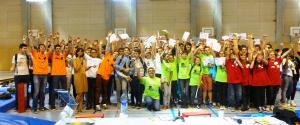ITER Robots—just like in real life!
They had left early—some of them very early—from different points of the Aix-Marseille region to be on time for the finals of the fourth ITER Robots competition. Organized by Agence Iter France and ITER Organization, in collaboration with the local representation of the French Ministry of National Education (Académie d'Aix-Marseille) and the CEA's magnetic fusion research institute (IRFM), the competition took place at the Lycée des Iscles in Manosque on Wednesday 20 May.
Months of preparation, imagination, trial-and-error, and hard work had forged their team spirit and the ten teams that had made it to the finals—five from junior high school and five from high school—were ready to compete.
The challenge, as in previous years, was based on the simulation of a real-life situation that will occur over the 20-year course of ITER operation: the removal by remote handling of selected blanket modules from the inner wall of the vacuum vessel, followed by transport of the modules to the nearby Hot Cell Facility. Each team had customized and programmed its Lego kit, passed preselection tests, and was now ready to face the jury and their peers.


